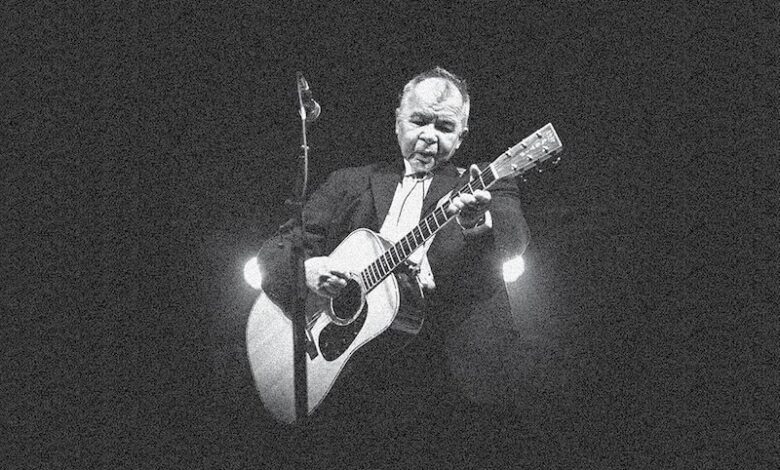Book Review | ‘Living in the Present with John Prine’ by Tom Piazza

Living in the Present with John Prine, the new book by Tom Piazza, seems like it shouldn’t work. Piazza’s encounters with Prine were too scattered and too few. Their connection too tenuous. And yet, somehow, the same way Prine could turn a song around in an instant with a hilarious image or a surprising simile, Piazza pulls it off.
In 2018, Piazza, a New Orleans–based music journalist and novelist, and the head writer for the HBO show Treme, accepted an assignment with the Oxford American magazine to write a profile of John Prine. The two men hit it off, and Prine asked Piazza to write his biography. Piazza and Prine saw each other several times, and they exchanged messages frequently, but it took a while for them to begin the biography in earnest. In fact, they only got in two days of recorded interviews before circumstances dictated that they stop and reschedule for two weeks later.
The first interview took place on February 28 and 29 of 2020. On March 12, Piazza came down with a cold and, concerned about the new virus that was going around, he postponed their interview. Five days later, Prine’s wife, Fiona, tested positive for COVID-19. On March 26, Prine himself was taken to the ICU with the virus; on March 28, he was placed on a ventilator. He passed away on April 7.
Piazza acknowledges the limits of the material he had to work with: “This isn’t a biography of John Prine, or a chronicle of John’s musical development, a critical assessment, an oral history, or a study of his influence on American culture.” What is it then? Piazza characterizes Living in the Present with John Prine as “a book about friendship, and loss.” But that’s not exactly right. Piazza knows his readers are interested in Prine’s life, not his own, and he mostly does a good job of staying out of the way when the star is on stage. What the book feels like, actually, is the kind of biography where the biographer tacitly acknowledges the impossibility of ever fully knowing and describing their subject and, instead, works to make select moments so vivid that they illuminate the rest of the subject’s life.
In addition to his handful of extended visits with Prine, Piazza also relies on an interview with Jason Wilber, Prine’s lead guitarist for 24 years, and another with Dave Prine, John’s older brother and the person who taught John to play guitar and introduced him to the late sixties Chicago folk music scene where John got his start.
So what do we learn about John Prine from this limited font of information? Quite a bit, as it turns out. Prine, as the title indicates, lived fully in the present, embracing whatever activity he was engaged in, taking a special pleasure in eating and drinking. He loved hot dogs and meatloaf and pork chops and mashed potatoes and mac and cheese. He was partial to cocktails, particularly the Handsome Johnny, a concoction of vodka and diet ginger ale. He liked old, established restaurants and classic diners and any place with a jukebox — he had one of his own, though it didn’t work. He devoured Archie comics with an unexpected passion.
He read people quickly and accurately, almost immediately sussing out the phonies and the hangers-on. He was a big talker, who loved telling funny stories. But he also loved listening to a good story, and he was a gracious and attentive friend. In the words of Jason Wilber: “He was unflappable; he didn’t get ruffled for no reason …. He was so easygoing, and I felt like he always gave people the benefit of the doubt. If somebody said something negative or was being a jerk and you mentioned it to John, he’d be like, ‘Well, maybe he was just having a bad day.’”
Above all, Prine loved being on stage and making music, and people loved to watch him perform. Among the highlights of Living in the Present is Piazza’s descriptions of playing guitar with his hero at Prine’s Nashville home in December of 2019. Piazza happily swaps acoustic guitars for the evening with his host. Prine plays Piazza’s Martin 0-16, while Piazza borrows a guitar owned by the late Steve Goodman, who wrote the song “City of New Orleans,” and was Prine’s best friend. The two men jam, according to Prine’s very tolerant wife, until 3 a.m., playing everything from Mississippi John Hurt’s “My Creole Belle,” to Jimmie Rodgers’s “Mother, the Queen of My Heart,” to an Ernest Tubb–inflected version of the Beatles’ “All My Loving.” It’s heaven for Piazza — “we were in some timeless place” — with this one little hootenanny standing in for the hundreds, or thousands, Prine must have joined in during the course of his 73 years on earth.
Ultimately, the great achievement of Living in the Present is that you, the reader, feel as though you also kind of knew John Prine, and, wow, wasn’t that a lucky thing! He was a really, really good guy. You remembered every day you ever spent in his company. And you were far from alone in your appreciation of him. Just running into John Prine on the street made people smile.
This review originally appeared in the California Review of Books.
Source link

